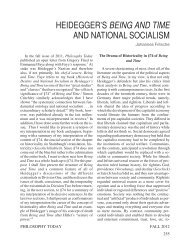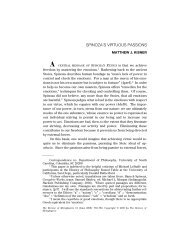Perverted Conversions: - Philosophy Documentation Center
Perverted Conversions: - Philosophy Documentation Center
Perverted Conversions: - Philosophy Documentation Center
Create successful ePaper yourself
Turn your PDF publications into a flip-book with our unique Google optimized e-Paper software.
— 148 —<br />
Rachel Walsh<br />
• • •<br />
demands the imperial cure of secular democracy that is always a failed performative<br />
act, as the Islamic Other, being a less advanced body, indeed being only a body,<br />
cannot be cured.<br />
Notably, the American soldier who faces the effaced Islamic Other but whose<br />
gaze addresses the camera, holds his weapon with both hands as if to keep the<br />
Islamic Other’s contagion of filth at bay, despite the obvious vulnerability of the<br />
prisoner’s position. The posture of the American soldier concretizes a civilizational<br />
discourse that configures Islam as a pathology to be cured or a problem to be solved,<br />
at the same time that it posits its own use of force as offering a curative power.<br />
Wendy Brown’s discussion of the imperial cure that is civilization serves as an<br />
uncanny narration of this photograph: “What will hold barbarism at bay is precisely<br />
what recenters the West as the defining essence of civilization and what legitimates<br />
its efforts at controlling the globe.” 36 The contrived positions of the two men,<br />
however, demonstrate that the barbarism of the pathologized Islamic Other must<br />
first be invented in order to necessitate a cure. The petty sovereign, guarding and<br />
defining civilization, stands armed against the contagion of Islam, yet the Iraqi<br />
prisoner, with his body erect and his arms fully extended in a gesture of supplication,<br />
possesses an arresting and improbable dignity. Unlike many of the other prisoners,<br />
he is allowed to stand fully upright, assuming a stance that is denied to the men in<br />
the pyramid photographs. While we do not see his face, his very posture seems to<br />
ask the question that we must, if we are ever to reclaim the category of the “human,”<br />
continue to ask ourselves as viewers: “how long must I play this part in your<br />
imperial pageant?”<br />
36. Brown, Regulating Aversion, p. 181.

















